
| Part of the Politics series |
| Republicanism |
|---|
| |
Republicanism in Sweden (Swedish : Republikanism) is the collective term for the movement in Sweden that seeks to establish a republic and abolish the Swedish constitutional monarchy.

| Part of the Politics series |
| Republicanism |
|---|
| |
Republicanism in Sweden (Swedish : Republikanism) is the collective term for the movement in Sweden that seeks to establish a republic and abolish the Swedish constitutional monarchy.
A large part of the arguments for proclaiming a Swedish Republic are based on an ideological rejection of the monarchy, not necessarily on rejecting the individuals who actually exercise kingship. The effort towards a republic has been included in the early party platforms of the Social Democratic Party, the Left Party and the Green Party. [1] [2] [3] Outside of the usual party lines, there is also the Swedish Republican Association.
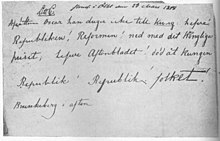
The precise year of the formation of the Kingdom of Sweden is lost to history, but Sweden was already a kingdom prior to the year 1000 and has never in its history been a republic.
Because of their trade with, for example, the Dutch Republic from the 16th century and onwards, the Swedes were not entirely unfamiliar with the phenomenon of a republic, but the first attempt to developing a republican Sweden came during the French Revolution. In the early 19th century, this was still a marginal movement. In 1830, it was for the first time that a prominent Swedish politician, Lars Johan Hierta, advocated for a republic, though without using the word "republic": in the newspaper Aftonbladet , that he himself had founded that same year, he pleaded for ousting king Charles XIV John of Sweden.
The next opportunity that a republic was discussed came during the European Revolutions of 1848. Sweden went through a short period of upheaval, the Marsoroligheterna ("March Disturbances"). On 18 and 19 March, riots broke out in Stockholm, during which about thirty people were killed by the army. During this time, controversial posters carrying the word "republic" were hung in several places in Stockholm and the surrounding region. Moreover, activists demanded equal and universal suffrage.
The Social Democratic Party had stated its intention to establish a republic in its party platform ever since its foundation in 1889. However, when it came into power in 1920, the desire had worn off. This is attributed to the pragmatism of its then leader Hjalmar Branting.
In 1997, the Swedish Republican Association was founded. In 2010, the umbrella Alliance of European Republican Movements (AERM) was founded in Stockholm, in which Swedish republicans cooperate with other European republican groups.

The political history of France covers the history of political movements and systems of government in the nation of France, from the earliest stages of the history of France until the present day. This political history might be considered to start with the formation of the Kingdom of France, and continue until the present day.
The abolition of monarchy is a legislative or revolutionary movement to abolish monarchical elements in government, usually hereditary.

Republicanism in the United Kingdom is the political movement that seeks to replace the United Kingdom's monarchy with a republic. Supporters of the movement, called republicans, support alternative forms of governance to a monarchy, such as an elected head of state. Monarchy has been the form of government used in the United Kingdom and its predecessor domains almost exclusively since the Middle Ages, except for a brief interruption in the years 1649–1660, during which a republican government did exist under the leadership of Oliver Cromwell.
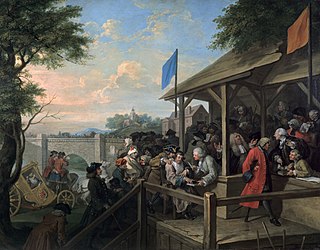
Political colours are colours used to represent a political ideology, movement or party, either officially or unofficially. They represent the intersection of colour symbolism and political symbolism. Politicians making public appearances will often identify themselves by wearing rosettes, flowers, ties or ribbons in the colour of their political party. Parties in different countries with similar ideologies sometimes use similar colours. As an example the colour red symbolises left-wing ideologies in many countries, while the colour blue is often used for conservatism, the colour yellow is most commonly associated with liberalism and right-libertarianism, and Green politics is named after the ideology's political colour. The political associations of a given colour vary from country to country, and there are exceptions to the general trends, for example red has historically been associated with Christianity, but over time gained association with leftist politics, while the United States differs from other countries in that conservatism is associated with red and liberalism with blue. Mass media has driven a standardization of colour by political party, to simplify messaging, while historically the colour a candidate chose to identify with could have been chosen based on other factors such as family or regional variations.
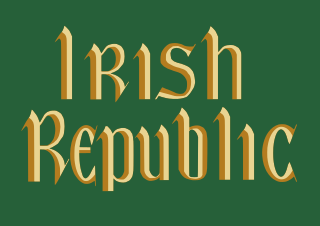
Irish republicanism is the political movement for the unity and independence of Ireland under a republic. Irish republicans view British rule in any part of Ireland as inherently illegitimate.
Liberalism and radicalism have played a role in the political history of France. The main line of conflict in France in the long nineteenth century was between monarchists and republicans. The Orléanists, who favoured constitutional monarchy and economic liberalism, were opposed to the Republican Radicals.
This article gives an overview of liberal parties in Brazil. It is limited to liberal parties with substantial support, mainly demonstrated by having had representation in parliament. The sign ⇒ indicates a reference to another party in that scheme. For inclusion in this scheme, it isn't necessary so that parties labeled themselves as a liberal party.

The dissolution of the union between the kingdoms of Norway and Sweden under the House of Bernadotte, was set in motion by a resolution of the Storting on 7 June 1905. Following some months of tension and fear of an outbreak of war between the neighbouring kingdoms – and a Norwegian plebiscite held on 13 August which overwhelmingly backed dissolution – negotiations between the two governments led to Sweden's recognition of Norway as an independent constitutional monarchy on 26 October 1905. On that date, King Oscar II renounced his claim to the Norwegian throne, effectively dissolving the United Kingdoms of Sweden and Norway, and this event was swiftly followed, on 18 November, by the accession to the Norwegian throne of Prince Carl of Denmark, taking the name of Haakon VII.

Radicalism was a political movement representing the leftward flank of liberalism during the late 18th and early 19th centuries and a precursor to social liberalism, social democracy, civil libertarianism, and modern progressivism. This ideology is commonly referred to as "radicalism" but is sometimes referred to as radical liberalism, or classical radicalism, to distinguish it from radical politics. Its earliest beginnings are to be found during the English Civil War with the Levellers and later the Radical Whigs.
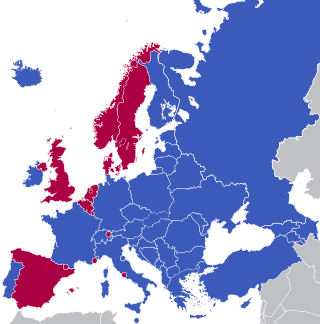
In the European history, monarchy was the prevalent form of government throughout the Middle Ages, only occasionally competing with communalism, notably in the case of the maritime republics and the Swiss Confederacy.

The revolutions of 1848, known in some countries as the Springtime of the Peoples or the Springtime of Nations, were a series of revolutions throughout Europe over the course of more than one year, from 1848 to 1849. It remains the most widespread revolutionary wave in European history to date.
Criticism of monarchy has occurred since ancient times. It can be targeted against the general form of government—monarchy—or more specifically, to particular monarchical governments as controlled by hereditary royal families. In some cases, this criticism can be curtailed by legal restrictions and be considered criminal speech, as in lèse-majesté.

The Alliance of European Republican Movements (AERM) is a grouping of republican movements from across Europe. It was established in Stockholm in June 2010, after the wedding of Swedish Crown Princess Victoria and Daniel Westling. The aim of the AERM is to provide a network for cross-party republican movements in all the countries of Europe that have a monarch as their head of state, in order to share information, resources and ideas and provide mutual assistance. Each member organisation will retain their autonomous national campaigns however, in recognition of their particular political and constitutional circumstances.
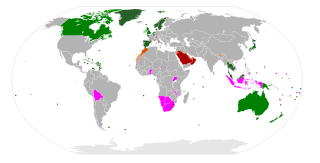
Monarchism is the advocacy of the system of monarchy or monarchical rule. A monarchist is an individual who supports this form of government independently of any specific monarch, whereas one who supports a particular monarch is a royalist. Conversely, the opposition to monarchical rule is referred to as republicanism.

The Revolutions of 1917–1923 were a revolutionary wave that included political unrest and armed revolts around the world inspired by the success of the Russian Revolution and the disorder created by the aftermath of World War I. The uprisings were mainly socialist or anti-colonial in nature. Some socialist revolts failed to create lasting socialist states. The revolutions had lasting effects in shaping the future European political landscape, with for example the collapse of the German Empire and the dissolution of Austria-Hungary.

The French Left refers to communist, socialist, and social-democratic political forces in France. The term originates from the National Assembly of 1789, where supporters of the revolution were seated on the left of the assembly. During the 1800s, left largely meant support for the Republic, whereas right largely meant support for the monarchy.

Republicanism in Spain is a political position and movement that holds that Spain should be a republic.

The Left Party is a socialist political party in Sweden. On economic issues, the party opposes privatizations and capitalism and advocates for increased public expenditures. In foreign policy, the party is Eurosceptic, being critical of the European Union, opposing Atlanticism, NATO and Sweden’s entry into the eurozone. It attempted to get Sweden to join the Non-Aligned Movement in 1980, but did not succeed. The party is eco-socialist, and supports republicanism. It stands on the left wing of the political spectrum.

Modern republicanism is a contemporary political ideology centered on citizenship in a state organized as a modern republic.